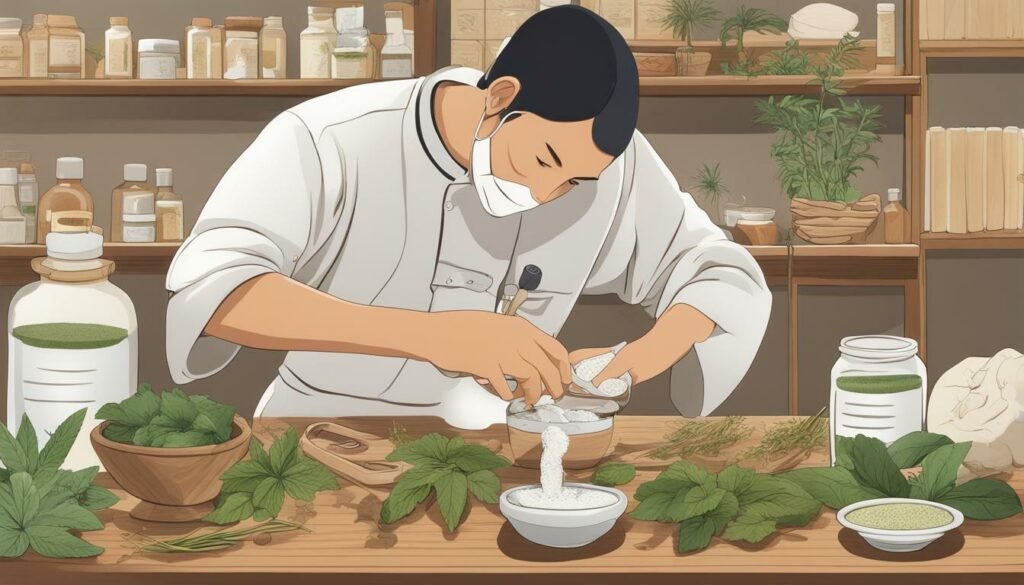Welcome to our in-depth exploration of alternative remedies and traditional medicine. The ongoing debate surrounding their effectiveness can leave many of us feeling confused and overwhelmed. In this article, we will explore the pros and cons of both approaches to healthcare, helping you make informed decisions about your health and wellness.
Key Takeaways
- Alternative remedies and traditional medicine are two different approaches to healthcare with their own unique advantages and limitations.
- Alternative remedies focus on holistic healing and natural remedies, while traditional medicine is grounded in scientific research and evidence-based practices.
- There are pros and cons to each approach, but integrative healthcare that combines both approaches can offer a comprehensive approach to patient care.
- Making informed choices about healthcare options requires consulting with professionals and considering personal needs and preferences.
Understanding Alternative Remedies
Alternative medicine refers to a range of treatments and therapies that are used instead of conventional medical approaches. These therapies may include natural remedies, such as herbal supplements, acupuncture, homeopathy, and other holistic healing methods.
At the core of alternative medicine is the belief that the human body has the ability to heal itself, given the right tools and environment. It focuses on treating the whole person, including the mind, body, and spirit, rather than just treating the symptoms of illness.
There are many benefits to using alternative remedies. For example, natural remedies are often less invasive and can have fewer side effects than conventional treatments. They can also be less costly, as they may not require expensive medications or procedures.
However, there are also potential drawbacks to using alternative remedies. Some treatments may not be backed by scientific research or may not be effective for everyone. Additionally, some natural remedies can interact with other medications, which can be dangerous.
Overall, alternative medicine can be a viable option for those looking for a holistic approach to their healthcare. It is important to carefully research and consult with healthcare professionals before trying any new therapies.

Exploring Traditional Medicine
Traditional medicine, also known as conventional or Western medicine, refers to medical treatments and practices that are based on modern science and research. The foundation of traditional medicine is evidence-based practices that have been rigorously tested and validated through scientific studies and clinical trials.
Medical professionals use traditional medicine to diagnose and treat illnesses using procedures such as surgery, medication, and radiation therapy. They may also use therapies such as physical therapy and occupational therapy to help patients recover from injuries and manage chronic conditions.
One of the strengths of traditional medicine is that it is regulated, ensuring that medical professionals are trained to the highest standards and that treatments are safe and effective. Additionally, traditional medicine is typically covered by health insurance, making it more accessible to a wider range of patients.
However, traditional medicine is not without its limitations. Some medical treatments can be invasive, painful, and have side effects. Additionally, the over-reliance on pharmaceuticals can lead to antibiotic resistance and a lack of focus on preventative care.
Despite its limitations, traditional medicine has made significant advances in the treatment of many illnesses and injuries and remains a cornerstone of modern healthcare.

Pros of Alternative Remedies
Alternative remedies offer a variety of potential benefits for those seeking a more natural approach to healthcare. One major advantage is the potential for fewer side effects. Unlike traditional medications, many natural remedies are derived from plants and herbs, making them less likely to cause adverse reactions.
Another benefit of alternative remedies is their focus on holistic healing. This means treating the whole person, not just the illness or symptom. Alternative medicine practitioners often take into account a patient’s mental, emotional, and spiritual well-being as well as their physical health.
In addition, alternative remedies may offer a potential for preventive care. Many natural remedies, such as vitamins and supplements, are believed to boost the immune system and protect against illness and disease.
Despite these potential benefits, it’s important to remember that alternative remedies are not a one-size-fits-all solution and may not be effective for every individual or condition. Consult with a healthcare professional before starting any alternative therapy.

We believe that incorporating alternative remedies into a balanced approach to healthcare can provide patients with a comprehensive and personalized treatment plan that meets their individual needs.
Cons of Traditional Medicine
While traditional medicine has many benefits, it is not without its drawbacks. One of the main concerns is the potential for side effects from medications and invasive procedures. For example, common painkillers such as opioids can be addictive and have negative effects on the body. Additionally, surgeries and other medical procedures can be risky and may lead to complications.
Another drawback of traditional medicine is the over-reliance on pharmaceuticals. Many medical treatments focus on managing symptoms rather than addressing the root cause of a health issue. This can lead to a reliance on long-term medication that may not be necessary if the underlying issue is properly addressed.
The cost of traditional medical treatments is also a concern for many individuals. Healthcare can be expensive, and traditional treatments can be particularly costly. This can be a barrier for those who cannot afford to pay for necessary treatments.

Weighing the pros and cons of traditional medicine can help individuals make informed healthcare decisions.
Incorporating Integrative Healthcare
As the debate over alternative remedies versus traditional medicine continues, it is important to consider the potential benefits of combining both approaches. This is where integrative healthcare comes in – a comprehensive approach that combines the best of both worlds to provide patients with optimal care.
Integrative healthcare utilizes complementary therapies in conjunction with conventional medical treatments. These therapies can include acupuncture, massage, yoga, meditation, and herbal medicine, among others. By integrating natural remedies with evidence-based medicine, healthcare providers aim to address the whole person, not just their symptoms.
Research has shown that integrative healthcare can lead to better health outcomes and improved quality of life for patients. For example, cancer patients who received acupuncture in addition to chemotherapy reported reduced pain and fewer side effects, according to a study published in the Journal of Clinical Oncology. Another study from the University of Maryland School of Medicine found that patients who practiced yoga during cancer treatment had a better quality of life and reduced levels of stress.
Integrative healthcare also allows for a more personalized approach to patient care. By considering a patient’s individual needs and preferences, healthcare providers can develop a treatment plan that is tailored to them. This can lead to greater patient satisfaction and better adherence to treatment plans.

However, it is important to note that not all complementary therapies are safe or effective. Like with any medical treatment, rigorous research and regulation are necessary to ensure that integrative healthcare is evidence-based and safe for patients.
Overall, integrating alternative remedies with traditional medicine can provide patients with a more comprehensive and effective approach to healthcare. By working together, healthcare providers can provide patients with the best of both worlds, leading to improved health outcomes and better quality of life.
Evaluating Safety and Effectiveness
When it comes to our health, safety and effectiveness are critical factors to consider. Alternative remedies and traditional medicine each come with their own set of potential benefits and drawbacks, but ultimately, their safety and effectiveness must be evaluated before use.
Alternative remedies, such as herbal medicine and acupuncture, may be perceived as natural and therefore safe. However, just because something is natural doesn’t mean it is always safe. Herbal remedies may have side effects or interact with other medications, and acupuncture may pose a risk of infection if not administered correctly.
On the other hand, traditional medicine is rooted in scientific research and follows evidence-based practices. Medical treatments and procedures have undergone rigorous testing to ensure their safety and effectiveness. However, there may be potential side effects from medications or risks associated with invasive procedures.
| Alternative Remedies | Traditional Medicine |
|---|---|
| Safety: Natural does not always equate to safe. Side effects and interactions with other medications may occur. | Safety: Based on scientific research and evidence-based practices. Rigorous testing ensures the safety and effectiveness of medical treatments. |
| Effectiveness: May provide a holistic approach to healing and promote preventive care. | Effectiveness: Procedures and treatments have undergone rigorous testing and are known to be effective. |
When considering the use of alternative remedies or traditional medicine, it’s important to consult with healthcare professionals and do thorough research on the safety and effectiveness of each option. Regulations for alternative remedies can vary widely, so be sure to look for reputable sources and consult with a healthcare provider before using any alternative remedies.
Ultimately, the decision to use alternative remedies or traditional medicine should be based on individual needs and preferences, and a balanced approach to healthcare should be prioritized.

Incorporating Integrative Healthcare
While alternative remedies and traditional medicine are often presented as opposing forces in healthcare, many health professionals are recognizing the benefits of integrating both approaches. This concept of integrative healthcare combines alternative remedies and traditional medicine for a more comprehensive approach to patient care.
Integrative healthcare recognizes that each person’s healthcare needs are unique, and that a combination of approaches may be the most effective solution. For example, a patient with chronic pain may benefit from acupuncture and massage therapy in addition to conventional pain medication.
Complementary therapies, which are alternative remedies used alongside traditional medical treatments, have shown promising results in various healthcare settings. A 2019 study found that acupuncture, when used in conjunction with medication, provided greater pain relief for patients with chronic pain than medication alone.
Integrative healthcare also emphasizes the importance of treating the whole person, not just the symptoms of a particular illness or condition. By addressing physical, emotional, and spiritual needs, integrative healthcare aims to improve overall health and wellness.
When considering healthcare options, it’s important to weigh the benefits and limitations of both alternative remedies and traditional medicine. Consulting with healthcare professionals and considering personal needs and preferences can help individuals make informed decisions about their healthcare.
In the next section, we will discuss the importance of evaluating the safety and effectiveness of both alternative remedies and traditional medicine.

Navigating the Controversy
When it comes to healthcare decisions, the ongoing controversy surrounding alternative remedies and traditional medicine can be difficult to navigate. Some argue that alternative remedies offer a more natural and holistic approach to healthcare, while others believe that traditional medicine is the only way to effectively treat illnesses and conditions.
At the heart of this controversy is the question of effectiveness. While alternative remedies often lack the rigorous testing and scientific validation of traditional medicine, some individuals swear by their effectiveness. Conversely, traditional medicine may come with a long list of potential side effects and risks, but it also has a proven track record of successful treatments.
It’s important to approach this controversy with an open mind and a willingness to consider different perspectives. Rather than dismissing one approach in favor of the other, we should aim for a balanced approach to healthcare that takes into account individual needs and preferences.
Ultimately, the decision between alternative remedies and traditional medicine should be made in consultation with healthcare professionals and based on the best available evidence. We encourage respectful dialogue and understanding as we continue to navigate this complex and controversial topic.

Conclusion
In summary, we have explored the pros and cons of alternative remedies versus traditional medicine. Both approaches have their benefits and limitations, and the decision to use one over the other ultimately depends on individual healthcare needs and preferences.
Alternative remedies, such as herbal medicine and acupuncture, offer a holistic approach to health and often have fewer side effects. However, it is important to ensure that these remedies are safe and evidence-based. On the other hand, traditional medicine is based on scientific research and has a proven track record of effectiveness, but can come with side effects and invasive procedures.
Integrative healthcare, which combines both approaches, has shown promise in providing comprehensive and personalized care. Safety and effectiveness should always be considered, and healthcare choices should be made in consultation with professionals and based on personal needs and preferences.
As controversy and debate continue surrounding alternative remedies and traditional medicine, it is important to approach these topics with open-mindedness and respect for different perspectives. Ultimately, a balanced approach to health and wellness is key.
Alternative Remedies vs. Traditional Medicine: Pros and Cons
FAQ
Q: What are the pros and cons of alternative remedies compared to traditional medicine?
A: Alternative remedies offer a holistic approach to health and often have fewer side effects. However, they may lack scientific evidence and regulation. Traditional medicine, on the other hand, is based on scientific research but can have more side effects and be costly.
Q: What are alternative remedies?
A: Alternative remedies include various types of treatments such as herbal medicine, acupuncture, and homeopathy. They focus on natural healing and overall well-being.
Q: What is traditional medicine?
A: Traditional medicine refers to conventional medical treatments based on scientific research and evidence. It includes common medical procedures and pharmaceutical treatments.
Q: What are the benefits of alternative remedies?
A: Alternative remedies often have fewer side effects, take a holistic approach to health, and can be used for preventive care. They can provide complementary options to traditional medicine.
Q: What are the drawbacks of traditional medicine?
A: Traditional medicine can have side effects from medications, involve invasive procedures, and rely heavily on pharmaceutical treatments. It can also be costly.
Q: What is integrative healthcare?
A: Integrative healthcare combines alternative remedies and traditional medicine for a comprehensive approach to patient care. It recognizes the value of both approaches and aims to provide the best treatment options.
Q: How can I ensure the safety and effectiveness of alternative remedies?
A: It is important to choose alternative remedies that are regulated and backed by scientific evidence. Consult with healthcare professionals to evaluate their safety and effectiveness for your specific condition.
Q: How can I make informed choices between alternative remedies and traditional medicine?
A: Consult with healthcare professionals to understand your options and consider your personal needs and preferences. Make an informed decision based on the best available evidence and the advice of knowledgeable professionals.
Q: Why is there controversy surrounding alternative remedies and traditional medicine?
A: The ongoing controversy stems from differing perspectives and arguments on the effectiveness, safety, and regulation of alternative remedies compared to traditional medicine. It is important to engage in informed and respectful dialogue on these topics.

